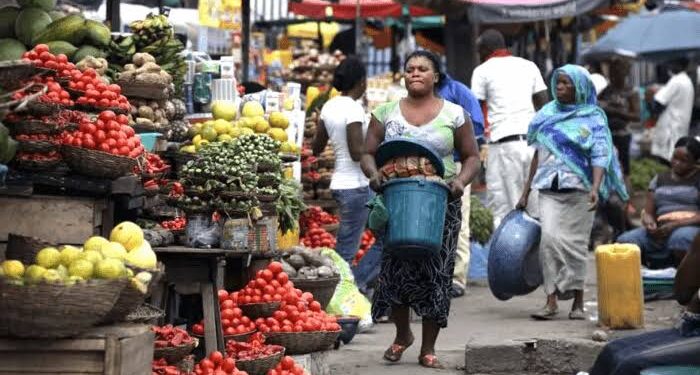By Adamu Lawal Toro
Nigeria is faced with food crisis that manifests in several ways. Despite being one of Africa’s largest agricultural producers, the nation faces severe food shortages, high prices, and widespread hunger. Factors contributing to this crisis include:
Insecurity and insurgency activities, particularly by Boko Haram in the North-East and banditry in the North-West that have disrupted farming activities, displaced farmers, and reduced food production.
Climate change with erratic weather patterns, floods, and droughts that are adversely affecting crop yields.
Poor infrastructure that hampers adequate transportation networks and poor storage facilities lead to significant post-harvest losses.
Policy failures and inconsistencies of agricultural policies with lack of support for smallholder farmers that will productivity.
It was in July last year that Nigeria’s President, Bola Ahmed Tinubu declared a state of emergency to tackle the rising costs of food and its perceived shortages in the aftermath of fuel subsidy removal. Under the state of emergency, food and water availability was directly put under the purview of national security council.
The council was charged with the responsibility to provide protection to farmers, many of whom have abandoned their farms as a result of the deteriorating security situation that is threatening their existence, loss of livelihood, endangered their traditional life savings through cattle rustling, banditry and kidnapping for ransom. To ensure the nation’s food security and make more food available and affordable, the government announced that some of the money that is being saved by the removal of fuel subsidy will be used to provide fertilizer, implements, and grains to farmers in addition to payment of stipend to poorer house hold for six months.
From the declaration of the State of Emergency to date, the national Bureau of statistics, National Bureau of Statistics (NBS) has shown that food inflation had risen from 29.98 percent to 40.18 percent in June 2024. The United Nations in its annual report on Food Security in Nigeria has estimated that over 25 million Nigerians are classified as food insecure as at last year and the number is steadily increasing drastically.
While the President has assured Nigerians that the government will create and support a National Exchange Board whose responsibility will be to review food pricing as well as maintain a strategic food reserve that will be used as price stabilization mechanisms for critical food items, the effect is yet to be seen as no such institution had been put in place. Even though the Central Bank is said to continue to playing a major role in funding the agriculture value chain, the New CBN management had since distanced itself from such intervention arguing that it distorts the economy and mandate of the apex bank.
The pains associated with the triple economic policies: fuel subsidy removal, floating of the Naira and the hike of electricity tariff has shown that many small and medium size businesses are going under as the cost of production or running the businesses have become unbearable. Many manufacturing concerns are now relocating to neighbouring countries.
Of all the promised intervention promised by the President, the only thing Nigerians are seeing so far, is the distribution of 20 trailer loads of rice to the 36 states and Abuja; no protection for the farmer, no inputs to simplify and boast production, no distribution of fertilizers whose price have now gone beyond the purchasing capacity of most average farmers in the open market.
With the food security situation further becoming unattainable to the majority of citizens, the federal government has now announced that it is embarking on food importation or opening our boarders for the importation of agricultural goods at zero duty rates to force food prices down. This, is a policy that is being rejected by agricultural actors and many well-meaning Nigerians including the President of African Development Bank Dr Femi Adesina who described the plan as one effort to disrupt the agriculture trajectory of Nigeria.
The duty-free importation of agricultural foods can have several negative effects on Nigerian farmers, particularly small-scale or peasant farmers due to:
Market Competition – imported agricultural products can be cheaper due to subsidies and lower production costs in other countries. This can make it difficult for local farmers to compete, potentially leading to reduced income and financial instability.
Reduced Incentive for Local Production – if imported foods flood the market, local farmers might be discouraged from producing certain crops, leading to a decline in domestic agricultural production.
Dependency on Imports – over reliance on imported foods can make the country vulnerable to global market fluctuations and supply chain disruptions.
Economic Impact – the local agricultural sector might suffer, leading to job losses and negatively impacting the rural economy where farming is a primary source of livelihood.
Food Security – while the policy might provide short-term relief from food shortages, it does not address the underlying issues of food security. Sustainable local production is essential for long-term food security.
Environmental Impact – increased importation can lead to higher carbon footprints due to transportation and can also discourage sustainable farming practices locally.
To mitigate these effects, it is crucial for the government to support local farmers through subsidies, improved infrastructure, and policies that encourage sustainable agricultural practices.
Nigeria’s haunting food crisis and the recently experienced protests against bad governance underscore the urgent need for comprehensive economic planning. The country, blessed with vast arable land and a youthful population, paradoxically grapples with food insecurity, which has been exacerbated by poor governance, economic mismanagement, and climate change.
In conclusion, Nigeria’s food crisis and the protests against bad governance highlights the dare need for acting fast. Addressing these challenges requires a multifaceted approach that prioritizes agricultural development, infrastructural improvement, security, climate resilience, governance reforms, and youth engagement. Only through comprehensive and well-implemented economic planning can Nigeria hope to achieve food security and sustainable development.











